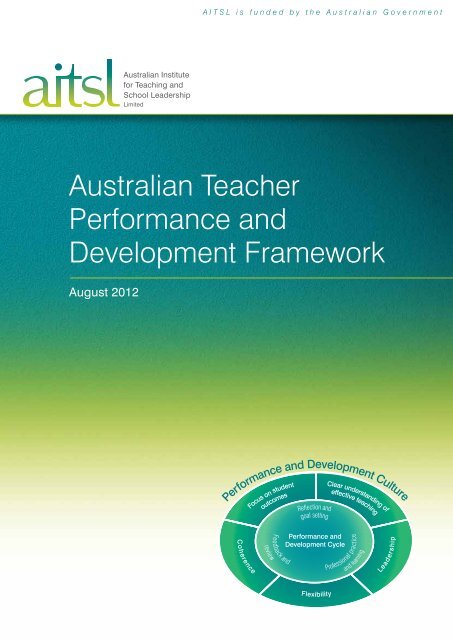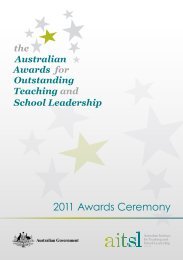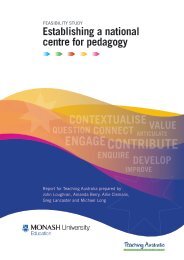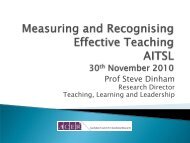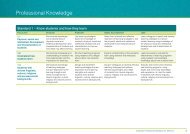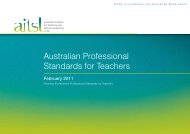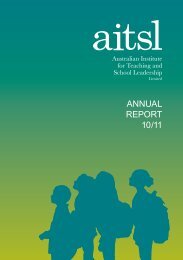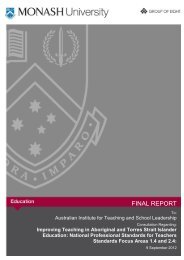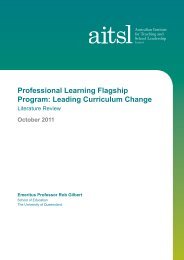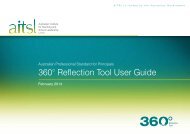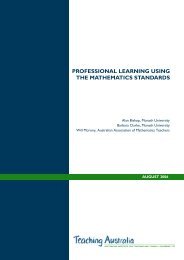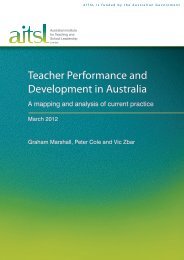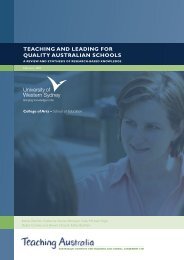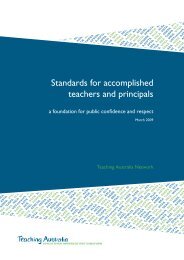Australian Teacher Performance and Development Framework
Australian Teacher Performance and Development Framework
Australian Teacher Performance and Development Framework
Create successful ePaper yourself
Turn your PDF publications into a flip-book with our unique Google optimized e-Paper software.
AITSL is funded by the <strong>Australian</strong> Government<strong>Australian</strong> <strong>Teacher</strong><strong>Performance</strong> <strong>and</strong><strong>Development</strong> <strong>Framework</strong>August 2012<strong>Performance</strong> <strong>and</strong> <strong>Development</strong> CultureFocus on studentoutcomes<strong>and</strong>ReflectionsettinggoalClear underst<strong>and</strong>ing ofeffective teachingC oherencereviewFeedback <strong>and</strong><strong>Performance</strong> <strong>and</strong><strong>Development</strong> CycleProfessional practice<strong>and</strong> learningLeadershipFlexibility
The <strong>Australian</strong> Institute for Teaching <strong>and</strong> School Leadership (AITSL) has been working closely with keyeducation stakeholders to develop the <strong>Australian</strong> <strong>Teacher</strong> <strong>Performance</strong> <strong>and</strong> <strong>Development</strong> <strong>Framework</strong>(the <strong>Framework</strong>). The <strong>Framework</strong> outlines the critical factors for creating a performance <strong>and</strong> developmentculture in schools, including essential elements that should be present in all <strong>Australian</strong> schools.In developing the nationally consistent approach to teacher performance <strong>and</strong> development, AITSL consultedwith all state <strong>and</strong> territory education employers, Catholic <strong>and</strong> Independent school authorities, teacher regulatoryauthorities, peak national bodies, including teacher unions <strong>and</strong> principal associations, <strong>and</strong> practising teachers<strong>and</strong> principals.The Institute’s responsibility to lead this work is outlined in its Letter of Expectation from the CommonwealthMinister for Education.The <strong>Australian</strong> <strong>Teacher</strong> <strong>Performance</strong> <strong>and</strong> <strong>Development</strong> <strong>Framework</strong> was endorsed by Education Ministers at theSt<strong>and</strong>ing Council on School Education <strong>and</strong> Early Childhood (SCSEEC) on 3 August 2012.The <strong>Australian</strong> Institute for Teaching <strong>and</strong> School Leadership was formed to provide national leadership for the Commonwealth, state <strong>and</strong> territorygovernments in promoting excellence in the profession of teaching <strong>and</strong> school leadership with funding provided by the <strong>Australian</strong> Government.© 2012 Education Services Australia as the legal entity for the St<strong>and</strong>ing Council on School Education <strong>and</strong> Early Childhood (SCSEEC).ISBN: 978-0-9872351-6-9Education Services Australia, as the legal entity for the St<strong>and</strong>ing Council on School Education <strong>and</strong> Early Childhood (SCSEEC) owns thecopyright in this publication. This publication or any part of it may be used freely only for non-profit education purposes provided the sourceis clearly acknowledged. The publication may not be sold or used for any other commercial purpose.Other than as permitted above or by the Copyright Act 1968 (Commonwealth), no part of this publication may be reproduced, stored,published, performed, communicated or adapted, regardless of the form or means (electronic, photocopying or otherwise), without theprior written permission of the copyright owner.Address inquiries regarding copyright to: SCSEEC Secretariat, PO Box 202, Carlton South, VIC 3053, Australia.
ContentsThe importance of teacher performance <strong>and</strong> development ................................................. 2A culture of performance <strong>and</strong> development .......................................................................... 3A focus on student outcomes ................................................................................................. 3A clear underst<strong>and</strong>ing of effective teaching ................................................................................. 3Leadership ........................................................................................................................ 4Flexibility ........................................................................................................................... 4Coherence ........................................................................................................................ 4<strong>Performance</strong> <strong>and</strong> development cycle ................................................................................. 5Reflection <strong>and</strong> goal setting ..................................................................................................... 5Professional practice <strong>and</strong> learning ............................................................................................ 6Feedback <strong>and</strong> review ............................................................................................................ 7The importance of implementation ..................................................................................... 8<strong>Teacher</strong> performance <strong>and</strong> development in context ......................................................................... 8The evidence base for this <strong>Framework</strong> ............................................................................... 9Acknowledgements ............................................................................................................ 10About AITSL .......................................................................................................................11<strong>Australian</strong> <strong>Teacher</strong> <strong>Performance</strong> <strong>and</strong> <strong>Development</strong> <strong>Framework</strong> – August 2012
The importance of teacher performance<strong>and</strong> developmentAustralia has a high performing education system thatfares well on international comparisons. This has beenachieved in large part through the efforts of highlyskilled <strong>and</strong> motivated teachers <strong>and</strong> school leadersover generations. However, the rest of the worldis not st<strong>and</strong>ing still. The Melbourne Declaration onEducational Goals for Young <strong>Australian</strong>s makes clearthat Australia aspires not to be among the best in theworld, but to be the best.It acknowledges the challenges <strong>and</strong> opportunitiesof the 21st century, <strong>and</strong> provides two simple, butpowerful goals to guide <strong>Australian</strong> education:Goal 1: <strong>Australian</strong> schooling promotesequity <strong>and</strong> excellence.Goal 2: All young <strong>Australian</strong>s become:> successful learners> confident <strong>and</strong> creative individuals> active <strong>and</strong> informed citizens.In seeking to achieve these goals, there is nomore important endeavour than further improvingthe quality of teaching in Australia. Nationally <strong>and</strong>internationally, there is unequivocal evidence thatthe quality of teaching is the most significant inschoolfactor affecting student outcomes. There isalso strong evidence that better appraisal, coaching<strong>and</strong> feedback leading to targeted development canimprove teacher performance. In Australia, thereare schools that have outst<strong>and</strong>ing performance<strong>and</strong> development practices <strong>and</strong> have seen tangibleimprovements in the quality of teaching as a result.However, in aggregate, <strong>Australian</strong> teachers reportthat they do not always get the feedback they needto improve. In an OECD survey, 63% of <strong>Australian</strong>teachers report that appraisal of their work is largelydone to fulfil administrative requirements.The <strong>Australian</strong> <strong>Teacher</strong> <strong>Performance</strong> <strong>and</strong> <strong>Development</strong><strong>Framework</strong> (the <strong>Framework</strong>) calls for the creationof a performance <strong>and</strong> development culture in all<strong>Australian</strong> schools. A performance <strong>and</strong> developmentculture is characterised by a clear focus on improvingteaching as a powerful means of improving studentoutcomes. In particular, it requires that teachers: knowwhat is expected of them; receive frequent, usefulfeedback on their teaching; <strong>and</strong> access high qualitysupport to improve their practice. This <strong>Framework</strong>aims to promote genuine professional conversationsthat improve teaching <strong>and</strong> minimise the risk thatadministrative <strong>and</strong> bureaucratic requirements willbecome the focus.The <strong>Australian</strong> <strong>Teacher</strong> <strong>Performance</strong> <strong>and</strong> <strong>Development</strong><strong>Framework</strong> highlights what is required to build acomprehensive <strong>and</strong> effective approach to highperformance <strong>and</strong> development. It outlines thecharacteristics of a successful system, <strong>and</strong> the culturethat needs to be in place for sustained improvementsto occur in schools. It describes the characteristicsof an effective performance <strong>and</strong> development cycle,including the elements of the cycle that are essentialfor success <strong>and</strong> should be implemented in all<strong>Australian</strong> schools.2 <strong>Australian</strong> <strong>Teacher</strong> <strong>Performance</strong> <strong>and</strong> <strong>Development</strong> <strong>Framework</strong> – August 2012
LeadershipResearch is clear not only on the importance ofschool leadership in improving school performance,but also on the critical role of leaders in creatinga culture of performance <strong>and</strong> development. The<strong>Australian</strong> Professional St<strong>and</strong>ard for Principals makesclear the role of the principal in leading teaching <strong>and</strong>learning, developing him or herself <strong>and</strong> others, <strong>and</strong>leading improvement in a school. All these elementsare central to a performance <strong>and</strong> development culture.While it is acknowledged that principals have a centralrole, a performance <strong>and</strong> development culture cannotbe driven by one person alone. Leadership mustcome from all levels, from those with <strong>and</strong> withoutformal leadership positions.A truly effective approach is characterised by a sharedcommitment to improvement <strong>and</strong> an acceptance thatteachers have a powerful role to play in each others’development, as well as their own.CoherenceIt is important that performance <strong>and</strong> developmentprocesses in a school fit with other arrangementsin which schools, teachers <strong>and</strong> school leaders areinvolved. <strong>Performance</strong> <strong>and</strong> development processes<strong>and</strong> teacher goals should reflect the overall approachto teaching <strong>and</strong> learning within a school, <strong>and</strong> shouldbe consistent with the school plans. It is important thatteachers <strong>and</strong> school leaders experience performance<strong>and</strong> development as something that ties together thevarious activities they are engaged in, rather than aseparate <strong>and</strong> additional process. Alignment to schoolplans <strong>and</strong> school-wide approaches to professionallearning are particularly important.FlexibilityAll schools are different, <strong>and</strong> need to respond to theirunique contexts <strong>and</strong> histories. Schools vary widely intheir existing approaches to teacher performance <strong>and</strong>development. It is clear that effective implementationtakes into account starting points, <strong>and</strong> that thesequencing of change will be different in differentsituations. This <strong>Framework</strong> describes the elementsof an effective approach to teacher performance <strong>and</strong>development, but acknowledges that these elementswill look different in each school.4 <strong>Australian</strong> <strong>Teacher</strong> <strong>Performance</strong> <strong>and</strong> <strong>Development</strong> <strong>Framework</strong> – August 2012
<strong>Performance</strong> <strong>and</strong> development cycleThe processes associated with teacher performance <strong>and</strong> development typically occur in a cycle which provides astructure for appraising, developing <strong>and</strong> refining teaching practice, <strong>and</strong> recognises the entitlement of teachers toreceive feedback <strong>and</strong> support. The components of the cycle are interwoven, will not necessarily occur in order, <strong>and</strong>may take more or less time depending on circumstances. However, the cycle provides a useful way of thinking aboutthe process, <strong>and</strong> assists in identifying its important elements.Within the performance <strong>and</strong> development cycle, there are four elements that are essential to an effectiveapproach. These have been distilled from the research, practitioner advice <strong>and</strong> an analysis of current goodpractice. While these are necessary, they will not by themselves be sufficient to gain the maximum benefit fromthis process. However, it is important to be clear about common requirements <strong>and</strong> the minimum level of supportthat all teachers can expect in <strong>Australian</strong> schools. This section of the <strong>Framework</strong> describes the components ofthe cycle, <strong>and</strong> the four essential elements that should be present in all <strong>Australian</strong> schools.<strong>Performance</strong> <strong>and</strong> <strong>Development</strong> CultureFocus on studentstudenton Focusoutcomes<strong>and</strong>Reflectionsettinggoalofunderst<strong>and</strong>ing ClearteachingeffectiveoherenceCreview<strong>and</strong>Feedback<strong>Performance</strong> <strong>and</strong><strong>Development</strong> CycleProfessional practice<strong>and</strong> learningLeadershipFlexibilityReflection <strong>and</strong> goal settingThe cycle begins with setting goals. To engagepurposefully in performance appraisal <strong>and</strong>development a teacher, with the support of theprincipal or delegate, must clearly articulate agreedgoals based on the school’s shared view of effectiveteaching, derived from the <strong>Australian</strong> ProfessionalSt<strong>and</strong>ards for <strong>Teacher</strong>s. These will include goalsrelated to a teacher’s impact in <strong>and</strong> beyond theclassroom. Goals should take into account theteacher’s own reflection on their teaching practiceinformed by evidence <strong>and</strong> feedback, the schoolstrategic plan, <strong>and</strong> goals or priorities set by <strong>and</strong>for teams of teachers within the school. Goals shouldbe designed to be measurable <strong>and</strong> should havea clear link to the types of evidence to be used asa basis for feedback <strong>and</strong> reflection. A teacher’sgoals should be regularly reviewed <strong>and</strong> adjusted ascircumstances change. Goals should address bothteacher performance <strong>and</strong> teacher development.Essential element: All teachers have a set ofdocumented <strong>and</strong> regularly reviewed goals relatedto both performance <strong>and</strong> development, <strong>and</strong> waysof measuring progress towards them, that are agreedwith the principal or delegate.<strong>Australian</strong> <strong>Teacher</strong> <strong>Performance</strong> <strong>and</strong> <strong>Development</strong> <strong>Framework</strong> – August 20125
Professional practice <strong>and</strong> learning<strong>Performance</strong> <strong>and</strong> development goals form thebasis for subsequent action to change <strong>and</strong> improveteaching practice. An effective approach to improvingpractice will include a conscious effort to collect <strong>and</strong>reflect on evidence that provides insight into theeffectiveness of teacher practice, <strong>and</strong> informs growth<strong>and</strong> access to high quality professional learning.This should occur in a context of frequent formal<strong>and</strong> informal feedback.An important part of effective professional practiceis collecting evidence that provides the basis forongoing feedback, reflection <strong>and</strong> further development.The complex work of teaching generates a rich <strong>and</strong>varied range of evidence that can inform meaningfulevaluations of practice for both formative <strong>and</strong> summativepurposes. Potential sources of evidence include:> evidence of the impact of teaching on studentoutcomes> direct observation of teaching> evidence of the teacher’s impact oncolleagues <strong>and</strong> the school as a whole> student feedback> peer/supervisor feedback> parent feedback> teacher self-assessment> evidence of participation in professionallearning <strong>and</strong> teacher reflection on its impact.This is far from being an exhaustive list. However, it doesrepresent the breadth of evidence most often cited in theinternational research on teacher effectiveness.There are some forms of evidence that are particularlyimportant in reviewing teacher performance. Evidenceof student learning directly captures the outcomesof teaching, <strong>and</strong> must have a central role. Researchshows observation of classroom teaching, linkedto timely <strong>and</strong> useful feedback that focuses onimprovement, is a particularly useful tool for teacherdevelopment, <strong>and</strong> is the most commonly used formof evidence across OECD countries. Beyond theclassroom, evidence should also demonstrate ateacher’s impact on colleagues <strong>and</strong> the performanceof the school.Engaging in high quality professional learning isa major strategy for improving teacher practice.An effective approach to professional learning isdescribed in the <strong>Australian</strong> Charter for the ProfessionalLearning of <strong>Teacher</strong>s <strong>and</strong> School Leaders. The Charter:> affirms the importance of learning in improvingthe professional knowledge, practice <strong>and</strong>underst<strong>and</strong>ing of all teachers <strong>and</strong> school leadersto achieve improvement in student outcomes> articulates the expectation that all teachers <strong>and</strong>school leaders actively engage in professionallearning throughout their careers> describes the characteristics of a high qualitylearning culture <strong>and</strong> of effective professionallearning, to assist teachers, school leaders <strong>and</strong>those who support them to get the most from theirprofessional learning.Based on research, the Charter identifies effectiveprofessional learning as being relevant, collaborative<strong>and</strong> future focused. It identifies the importance of alearning culture within a school, <strong>and</strong> emphasises thatprofessional learning should be based on changingteacher practice to meet student needs. Consistentwith this focus, access to professional learningopportunities should be negotiated to take intoaccount the priorities <strong>and</strong> resources of schools.Essential element: All teachers are supported inworking towards their goals, including through accessto high quality professional learning.Essential element: Evidence used to reflect on<strong>and</strong> evaluate teacher performance, including throughthe full review described below, should come frommultiple sources <strong>and</strong> include as a minimum: datashowing impact on student outcomes; informationbased on direct observation of teaching; <strong>and</strong>evidence of collaboration with colleagues.6 <strong>Australian</strong> <strong>Teacher</strong> <strong>Performance</strong> <strong>and</strong> <strong>Development</strong> <strong>Framework</strong> – August 2012
Feedback <strong>and</strong> reviewSchools with an effective approach to teacherperformance <strong>and</strong> development have a commitmentto ongoing formal <strong>and</strong> informal feedback <strong>and</strong>coaching built into their culture. Timely, frequent <strong>and</strong>improvement focused feedback supports teachers’efforts to improve their practice, guides choices aboutprofessional learning, <strong>and</strong> informs reflection on <strong>and</strong>revision of performance <strong>and</strong> development goals.Even in a context of frequent informal feedback,it is important to create space for a full reflection on ateacher’s performance against all of their performance<strong>and</strong> development goals, conducted using multiplesources of evidence gathered during the review period.This most often takes the form of a formal performance<strong>and</strong> development review. Such a review should includethe provision of verbal <strong>and</strong> written feedback thatprovides a basis for reflection on practice to informfurther improvement during the next cycle.Essential element: All teachers receive regular formal<strong>and</strong> informal feedback on their performance. Thisincludes a formal review against their performance<strong>and</strong> development goals at least annually, with verbal<strong>and</strong> written feedback being provided to the teacher.<strong>Australian</strong> <strong>Teacher</strong> <strong>Performance</strong> <strong>and</strong> <strong>Development</strong> <strong>Framework</strong> – August 20127
AcknowledgementsThe <strong>Australian</strong> <strong>Teacher</strong> <strong>Performance</strong> <strong>and</strong> <strong>Development</strong> <strong>Framework</strong> was endorsed by Education Ministers at theSt<strong>and</strong>ing Council on School Education <strong>and</strong> Early Childhood on 3 August 2012.Dr Chris Bourke MLAMinister for Education <strong>and</strong> Training(<strong>Australian</strong> Capital Territory)The Hon. Peter Garrett AM MPMinister for School Education,Early Childhood <strong>and</strong> Youth(<strong>Australian</strong> Government)The Hon. Adrian Piccoli MPMinister for Education(New South Wales)Deputy Chair, St<strong>and</strong>ing Council onSchool Education <strong>and</strong> Early ChildhoodThe Hon. Dr Christopher Burns MLAMinister for Education <strong>and</strong> Training(Northern Territory)The Hon. John-Paul Langbroek MPMinister for Education, Training <strong>and</strong> Employment(Queensl<strong>and</strong>)The Hon. Grace Portolesi MPMinister for Education <strong>and</strong> Child <strong>Development</strong>(South Australia)The Hon. Nick McKim MPMinister for Education <strong>and</strong> Skills(Tasmania)The Hon. Martin Dixon MLAMinister for Education(Victoria)The Hon. Peter Hall MLCMinister for Higher Education <strong>and</strong> SkillsMinister for the Teaching Profession(Victoria)The Hon. Peter Collier MLCMinister for Education(Western Australia)Chair, St<strong>and</strong>ing Council on SchoolEducation <strong>and</strong> Early Childhood10 <strong>Australian</strong> <strong>Teacher</strong> <strong>Performance</strong> <strong>and</strong> <strong>Development</strong> <strong>Framework</strong> – August 2012
About AITSLThe <strong>Australian</strong> Institute for Teaching <strong>and</strong> School Leadership was formed to provide national leadership for theCommonwealth, state <strong>and</strong> territory governments in promoting excellence in the profession of teaching <strong>and</strong>school leadership with funding provided by the <strong>Australian</strong> Government.AITSL works with the education community to:> set <strong>and</strong> maintain st<strong>and</strong>ards to promote excellencein teaching <strong>and</strong> school leadership> lead <strong>and</strong> influence excellence in teaching <strong>and</strong>school leadership> support <strong>and</strong> recognise excellence in teaching <strong>and</strong>school leadership.To find out more about AITSL <strong>and</strong> its work please visitaitsl.edu.au.Contact AITSLRequests for further information <strong>and</strong> any queriesregarding the <strong>Australian</strong> <strong>Teacher</strong> <strong>Performance</strong> <strong>and</strong><strong>Development</strong> <strong>Framework</strong> should be directed toperformance@aitsl.edu.au.<strong>Australian</strong> <strong>Teacher</strong> <strong>Performance</strong> <strong>and</strong> <strong>Development</strong> <strong>Framework</strong> – August 201211
aitsl.edu.auFurther informationTelephone: +61 3 9944 1200Email: performance@aitsl.edu.auMelbourne | Brisbane | CanberraAITSL is funded by the <strong>Australian</strong> GovernmentISBN 978-0-9872351-6-9Updated December 2012


